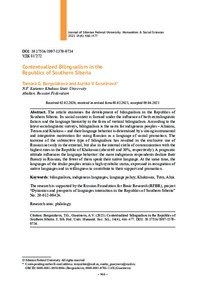Contextualized Bilingualism in the Republics of Southern Siberia
Скачать файл:
URI (для ссылок/цитирований):
https://elib.sfu-kras.ru/handle/2311/141247Автор:
Borgoiakova, Tamara G.
Guseinova, Aurika V.
Боргоякова, Т. Г.
Гусейнова, А. В.
Дата:
2021-04Журнал:
Журнал Сибирского федерального университета. Гуманитарные науки. Journal of Siberian Federal University. Humanities & Social Sciences 2021 14(4)Аннотация:
The article examines the development of bilingualism in the Republics of Southern Siberia. Its social context is formed under the influence of both extralinguistic factors and the language hierarchy in the form of vertical bilingualism. According to the latest sociolinguistic surveys, bilingualism is the norm for indigenous peoples – Altaians, Tuvans and Khakass – and their language behavior is determined by a strong instrumental and integrative motivation for using Russian as a language of social promotion. The increase of the subtractive type of bilingualism has resulted in the exclusive use of Russian not only in the external, but also in the internal circle of communication with the highest rates in the Republic of Khakassia (about 60 and 30%, respectively). A pragmatic attitude influences the language behavior: the more indigenous respondents declare their fluency in Russian, the fewer of them speak their native language. At the same time, the languages of the titular peoples retain a high symbolic status, expressed in recognition of native languages and in willingness to contribute to their support and promotion В статье исследуется развитие билингвизма в республиках Южной Сибири.
Его социальный контекст формируется под влиянием как экстралингвистических
факторов, так и языковой иерархии в форме вертикального билингвизма. Согласно
последним социолингвистическим опросам, билингвизм является нормой для коренных
народов – алтайцев, тувинцев и хакасов – и их языковое поведение определяется
сильной инструментальной и интегративной мотивацией использования русского языка
в качестве языка социального продвижения. Усиление замещающего типа билингвизма
привело к исключительному использованию русского языка не только во внешнем,
но и во внутреннем кругу общения с самыми высокими показателями в Республике
Хакасия (около 60 и 30 % соответственно). Прагматический подход влияет на языковое
поведение: чем больше респондентов из числа коренных народов заявляют о своем
владении русским языком, тем меньше из них говорят на родном языке. В то же время
языки титульных народов сохраняют высокий символический статус в глазах их
носителей, выражающийся в признании родных языков и в готовности содействовать
их поддержке и продвижению

